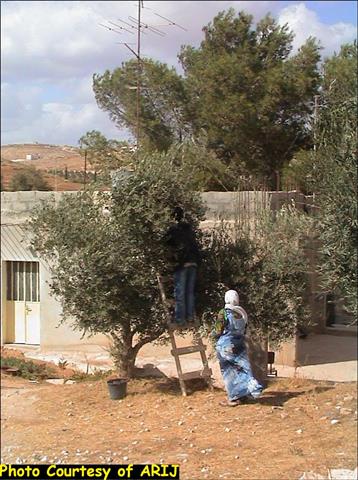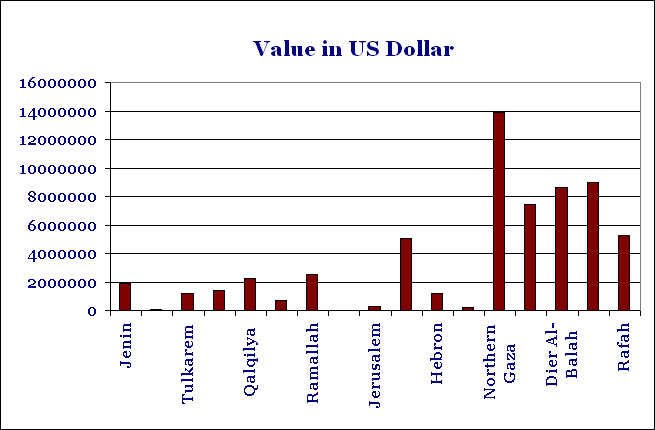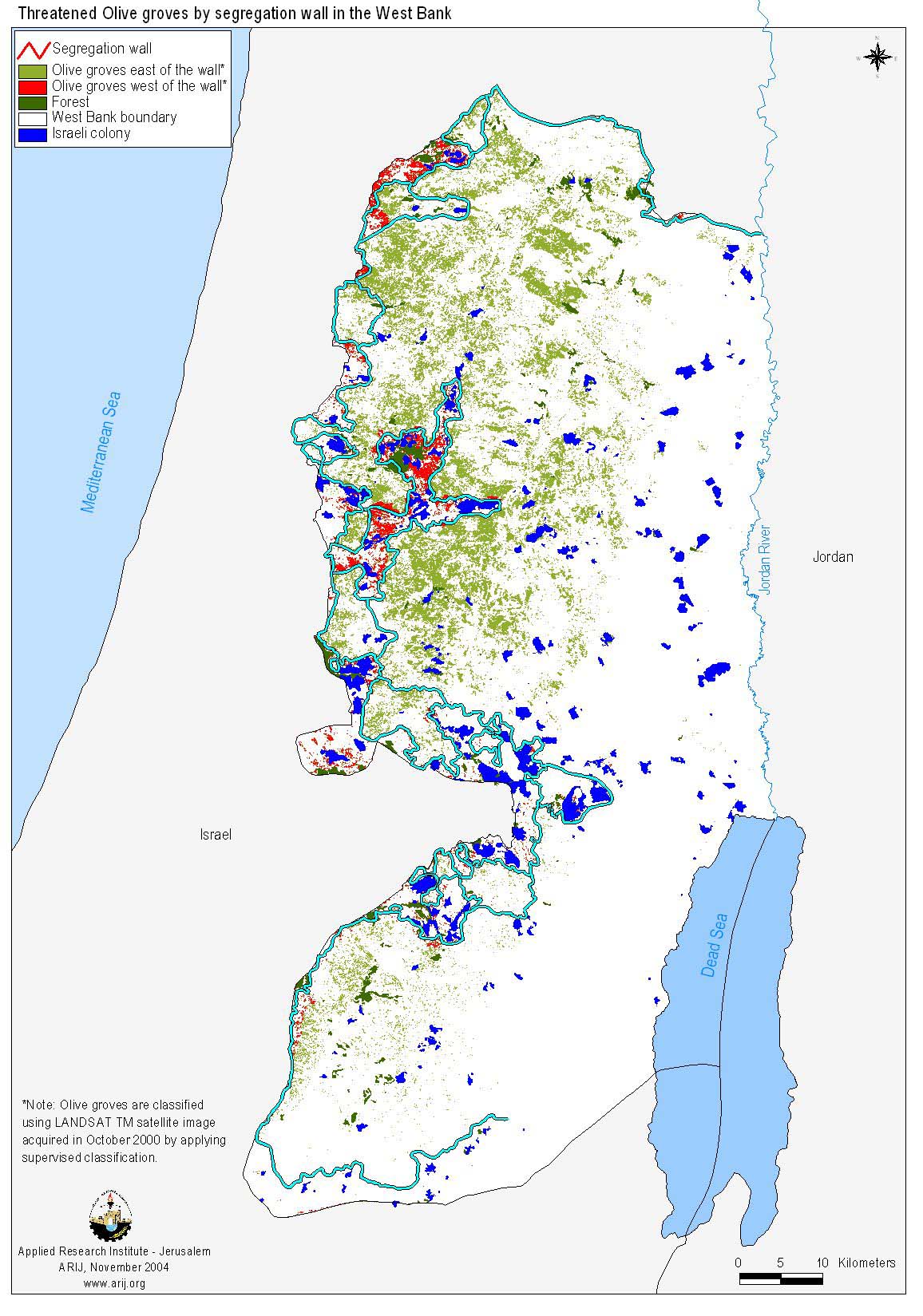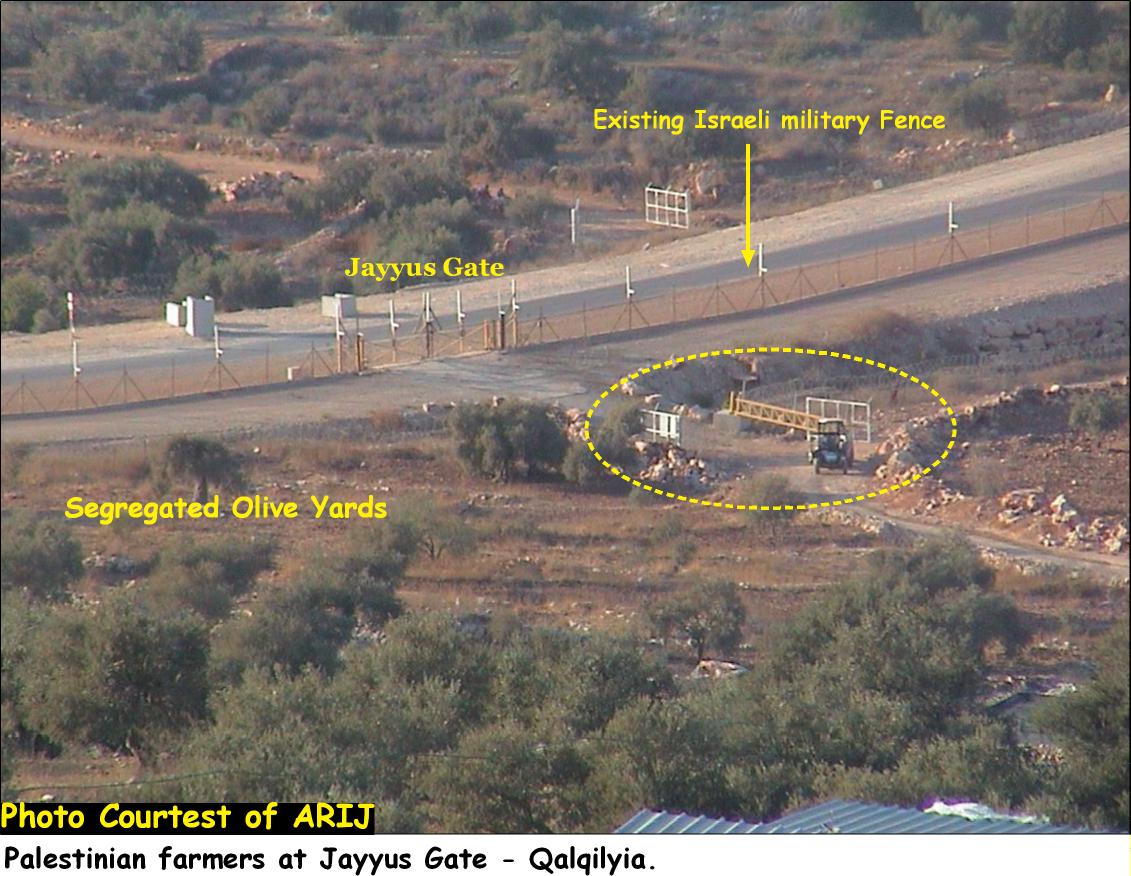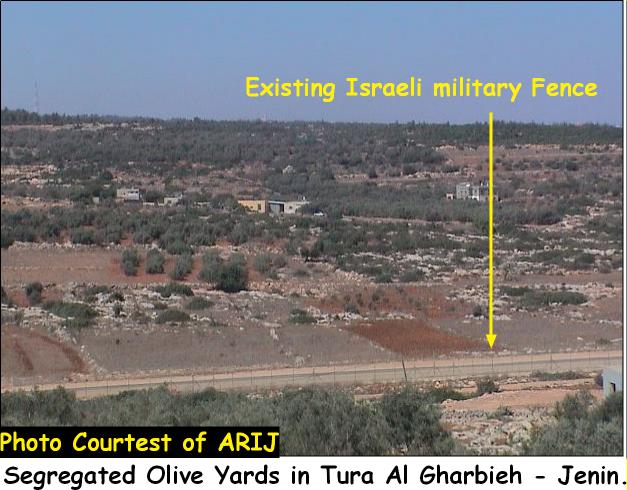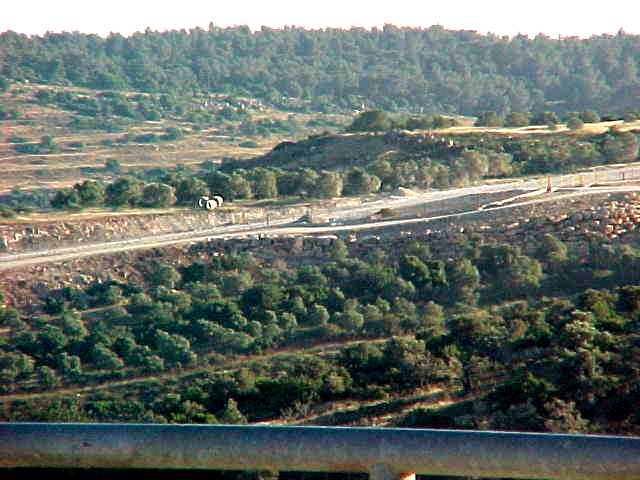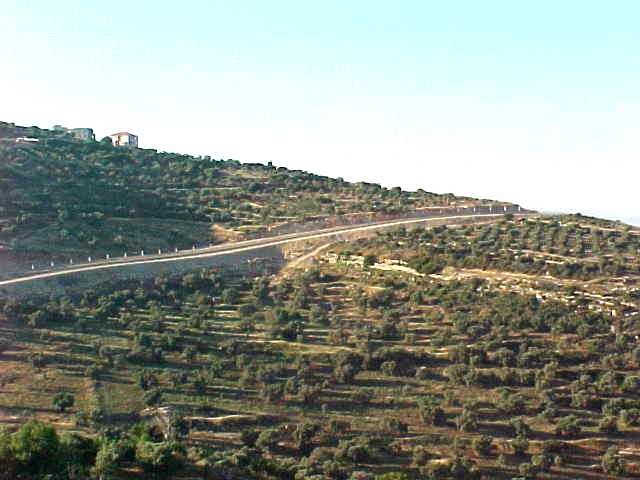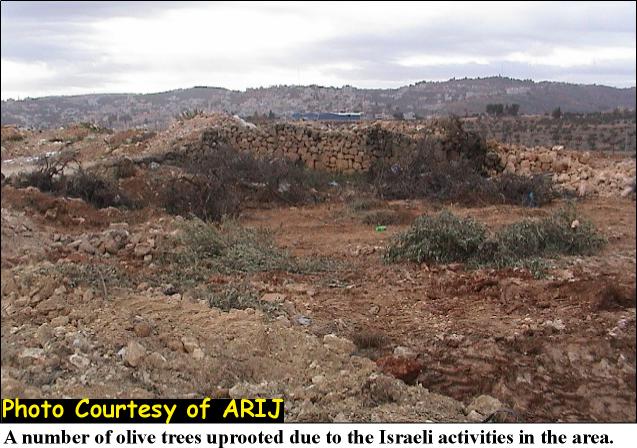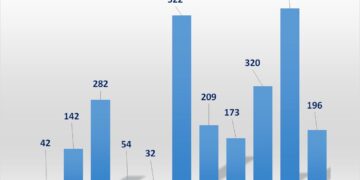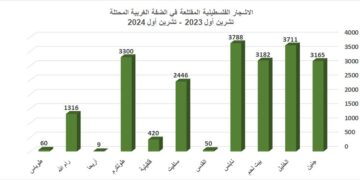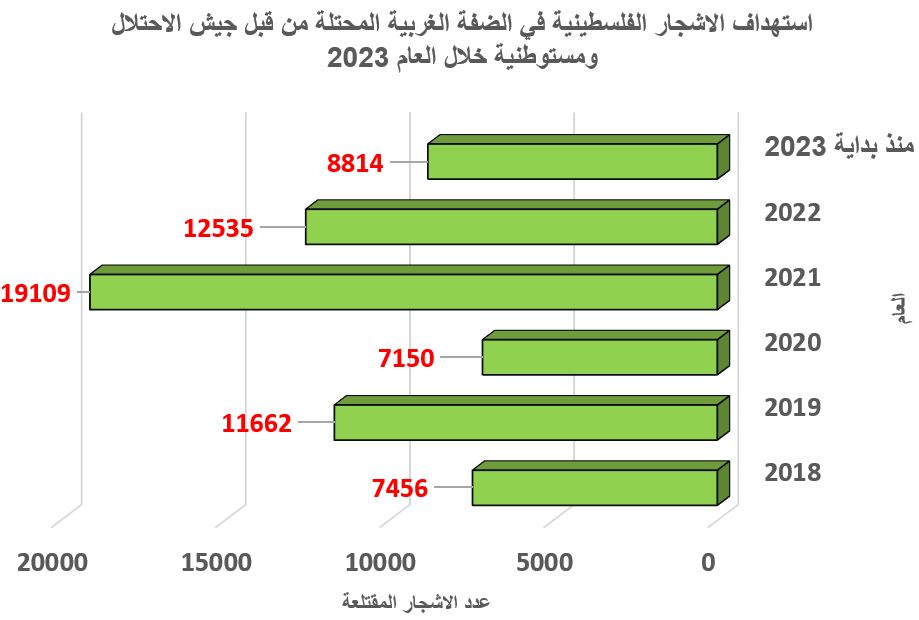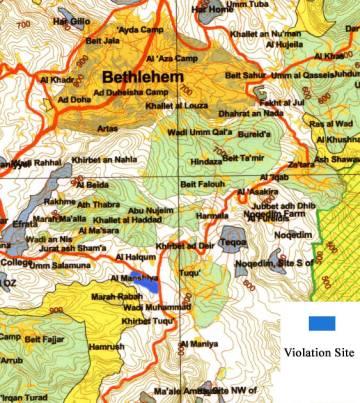The autumn months in Palestine mark the season for harvesting olives. The olive harvest is traditionally a joyful and celebrated time of the year in Palestinian communities. Since the Israeli occupation began in 1967, however, Israeli imposed restrictions on olive harvesting have severely affected Palestinian communities dependent upon olives for their livelihood. The last four years of the second Intifada have witnessed an especially harsh time for Palestinians. Since October 2000, Israeli occupying forces and militant extremist Israeli settlers have engaged in a sustained attack upon Palestinian olive farming and harvesting. As a result, Palestinians have almost lost the ability to maintain the culture and traditions that have been an integral part of their national life for centuries.
The Palestinian people have always considered the olive tree as both an indispensable element of their livelihood and a symbolic token of peace and prosperity. See photo 1
Olives are the staple crops for a Palestinian society traditionally dependent on agriculture. Olive groves constitute more than 40.3% of the cultivated area in the West Bank and Gaza Strip and 79% of cultivated fruit trees. The number of olive trees planted in Palestine today exceeds 12 million, spread over 13.26% (750,000 dunums) of the West Bank and 11% (11,200 dunums) of the Gaza Strip. See Photo 2
In the last four years, however, the Israeli occupying forces have uprooted almost 400,000 olive trees with a value of over 60 million dollars (U.S.) This systematic attack on the olive groves of Palestine constitutes an immense economic and environmental disaster that promises to impact Palestinian society severely for generations to come.
An Invaluable Commodity: Olives as a Means of Existence
Many Palestinian communities are financially dependent upon the olive harvest. The annual income of generated by olives and olive products comprises 40% of the gross product of fruit trees in Palestine and more than 20% of the overall national agricultural output. The olive crop makes up approximately 4.6% of the Palestinian GDP. Olive oil production averages 30,000 tons per annum and is highest in the northern districts of the West Bank The northern districts account for 68.5% of Palestine's olive trees The southern districts of the West Bank contain 30.1% olive treeswhile the remaining 1.4% is located in the Gaza Strip.[8] The following table shows the total area planted with olive trees.
|
Table 1: Distribution of Olive Trees in the Occupied West Bank and Gaza Strip |
||||||
|
West Bank Districts |
Dunums |
% |
|
Gaza Strip Districts |
Dunums |
% |
|
Jenin |
513,750 |
68.5 |
Northern Gaza |
11,200 |
1.4 |
|
|
Tubas |
Gaza |
|||||
|
Tulkarem |
Dier Al-Balah |
|||||
|
Nablus |
Khan Yunis |
|||||
|
Qalqilya |
Rafah |
|||||
|
Salfit |
|
|
|
|||
|
Ramallah |
225,750 |
30.1 |
||||
|
Jericho |
||||||
|
Jerusalem |
||||||
|
Bethlehem |
||||||
|
Hebron |
||||||
|
Dora |
||||||
|
|
|
|||||
|
West Bank Total |
739,500 [9] |
98.6 |
Gaza Strip Total |
11,200 |
1.4 |
|
Olive trees have always been essential elements in the cultural life and physical existence of the Palestinian people. The trees are also a means of existence for families benefiting from its numerous products including oil, soap, and wood. Furthermore, olives and olive oil contain a natural acid called ''oleic acid'' which neutralizes some of the unhealthy side-affects of other fats and oils which can clog arteries and cause heart attacks. Thus, the nutritional value of olive oil has proven to be invaluable. More directly, for many Palestinians the olive tree is irreplaceable as the primary source of income for more than 100,000 Palestinian families in the West Bank and Gaza Strip.
A Matter of Life and Death: The Actions of Israeli Soldiers and Settlers
Actions by Israeli occupying forces during the past four years have made it much more difficult for Palestinian families to harvest their olivesRestrictions on Palestinian olive harvesting and assaults on Palestinian farmers are systematic in the Occupied Palestinian Territories and are a matter of policy for the Israeli occupation authorities. Israeli occupation policies include, but are not limited to, the following:
-
Curfews: Palestinians who leave their homes and venture into their olive groves can be immediately arrested or shot on site for violating Israeli imposed curfews.
-
Permits: Israeli occupation authorities require Palestinian farmers to apply for permits to access their lands in certain areas. The application procedure for these permits is long, tedious and often impossible for Palestinian families. The permit system is used by Israeli occupying forces as an institutionalized method of discrimination and dispossession.
-
Confiscation of ID Cards: Palestinian farmers violating Israeli imposed curfews or accessing their lands without certain Israeli issued permits can have their ID cards confiscated by Israeli occupying forces. Palestinians are required to carry these Israeli issued identification cards (hawiyya) at all times. If a Palestinian is stopped by Israeli soldiers and cannot present this identification card he or she can be immediately detained and held indefinitely without charge or trial.
-
Confiscation of Equipment: Palestinian farmers harvesting olives in certain areas without an Israeli issued permit may also have their equipment confiscated by Israeli occupying forces.
-
Fines: These same farmers may also be fined excessively for 'trespassing' on their own lands if they attempt to cultivate their olives without the required Israeli issued permits.
-
Destruction of Crops: Israeli occupying forces have uprooted almost 400,000 Palestinian olive trees in the last four years The Israeli army has also been known to burn Palestinian crops and even drop chemical agents, such as napalm agents, on Palestinian agricultural land in certain areas.
Attacks and restrictions by the Israeli military have severely affected the ability of many Palestinian farmers to provide for their families and have jeopardized the survival of numerous Palestinian communities. However, assaults by extreme and militant Jewish Israeli settlers have been the most dangerous and problematic for Palestinian farmers and peasantsSettler attacks on Palestinian olive harvesters have become an annual ritual during the olive season. Israeli settlers escalate their attacks on Palestinians during this period, militarily seizing olive groves and assaulting and even killing Palestinian farmers who attempt to pick their olives. These settlers are usually protected by the Israeli occupying forces. Israeli soldiers often allow the settlers to occupy and take control of Palestinian land, including olive groves. Settlers also often act with impunity when they attack Palestinian farmers and many murders have gone unpunished
These systematic Israeli attacks not only target the Palestinian people but also the very roots of Palestinian existence on the lands they have cultivated for generations. For example, settlers commonly steal olives from Palestinian groves before the owners are able to harvest the trees. The theft of olives is rarely, if ever, stopped by Israeli occupying forces that often intervene on behalf of the settlers.
In addition to these attacks, there have also been widespread and systematic examples of the destruction of Palestinian olive groves. In the past four years of the second Intifada, Israeli settlers and the Israeli Army have uprooted 382,695 olive trees throughout the West Bank and Gaza Strip The market value for these uprooted trees is more than 60 million in US dollars (not including revenues lost by the sale of olive products the trees would have provided). In all, since 1967 Israeli occupying forces have uprooted more than 1 million Palestinian olive trees.
Olive groves have been cleared from strategic locations in order to facilitate Israeli colonization of the Occupied Palestinian Territories by opening new lands for Jewish Israeli settlements, bypass roads and, most recently, the Segregation Wall. In addition, Israeli policies of collective punishment often target entire Palestinian communities and include uprooting trees as a means of punishment and intimidation. The following graphs and table illustrate the number of olive trees uprooted in the West Bank and Gaza Strip from September 2000 to June 2004
|
Table 2: Uprooted Olive Trees by the Israeli Army (September 2000 – June 2004) |
||
|
|
||
|
West Bank District |
Uprooted Olive Trees |
Value in US Dollar |
|
Jenin |
12,664 |
1,872,900 |
|
Tubas |
1,176 |
83,610 |
|
Tulkarem |
12,099 |
1,192,350 |
|
Nablus |
39,419 |
1,398,135 |
|
Qalqilya |
10,383 |
2,214,480 |
|
Salfit |
14,755 |
726,900 |
|
Ramallah |
12,777 |
2,501,200 |
|
Jericho |
30 |
6,000 |
|
Jerusalem |
2,751 |
275,100 |
|
Bethlehem |
19,843 |
5,065,750 |
|
Hebron |
17,425 |
1,196,007 |
|
Dora |
1,141 |
222,250 |
|
West Bank Total |
144,463 |
16,754,682 |
|
|
||
|
Gaza Strip Districts |
Uprooted Olive Trees |
Value in US Dollar |
|
Northern Gaza |
67,813 |
13,904,365 |
|
Gaza |
36,904 |
7,409,840 |
|
Dier Al-Balah |
48,360 |
8,619,486 |
|
Khan Yunis |
52,046 |
8,991,625 |
|
Rafah |
33,109 |
5,250,585 |
|
Gaza Strip Total |
238,232 |
44,175,901 |
|
|
||
|
West Bank and Gaza Strip Total |
382,695 |
60,930,583 |
The Segregation Wall: Impact on the Olive Harvest
The Segregation Wall Israel is building on Palestinian land in the West Bank constitutes a major violation of international law and a major blow to the social fabric of Palestinian life. Western sections of the Wall are currently under construction in the West Bank. These sections have already appropriated 18.4% of Palestinian land in the West Bank. The number of olive trees uprooted as a direct result of the Israeli construction surpasses 45,000 (31% of the total number uprooted in the West Bank). The Wall has affected more than 126 Palestinian communities, separating numerous Palestinian towns and villages from their lands and olive groves.
Furthermore, at least 280,000 Palestinians are in danger of finding themselves contained within isolated ghettos, cut off from both their own lands and the main Palestinian cities. See Photo 3 & Photo 4
The huge losses incurred by Palestinian communities in the West Bank are a result of Israel's construction of the Wall deep within Palestinian territory. When complete, the Segregation Wall promises to leave over 50% of Palestinian land in the West Bank and Gaza Strip in Israeli hands. Israeli occupying forces have also prohibited many Palestinian farmers from accessing their lands outside the Wall and harvesting their olives and other crops. Instead of relaxing restrictions during this crucial time of year, the Israeli army has increased restrictive measures and harassment of Palestinian families attempting to access their lands and harvest their olives.
Illegal Policies: International Law and the Israeli Assault on Olive Harvesting
Since the seizure of the Palestinian Territories in 1967 Israel has maintained the long-term belligerent occupation of the West Bank, Gaza Strip and East Jerusalem (as well as the Syrian Golan Heights) in blatant violation of international law. United Nations security Resolution 242 (1967) called on Israel to withdraw from these territories immediately following the cessation of hostilities in the 1967 war. For the past 37 years, consecutive Israeli governments have refused to comply with this binding resolution. Furthermore, since the Palestinian Territories have a legal status of occupied territory under international law, Israeli authorities are required to act in accordance with international humanitarian law.
The Hague Conventions of 1907 and The Fourth Geneva Convention of 1949 are the primary canons of international humanitarian law. These conventions require an occupying power to act in accordance with basic principles of humanity regarding the occupied population and its territory. Among the practices most stringently prohibited by these conventions are the systematic destruction of public property and the use of collective punishment. Israeli policies in the Occupied Palestinian Territories, however, have consistently violated the terms of these conventions. Israeli imposed restrictions on Palestinian olive harvesting and the systematic policy of uprooting olive trees constitute one manner in which Israeli occupation authorities are violating fundamental precepts of international humanitarian law.
The Hague Conventions of 1907
The uprooting of olive trees and the seizure of Palestinian lands to build Israeli settlements, by-pass roads and the Segregation Wall is explicitly outlawed by the Hague Conventions of 1907. Convention IV, Article 23 (G) clearly states that the occupying power is forbidden, 'To destroy or seize the enemy's property, unless such destruction or seizure be imperatively demanded by the necessities of war.'
The Hague Conventions also expressly prohibit Israeli policies targeting olive groves for destruction as a means of collective punishment. Convention IV, Article 50 states, 'No general penalty, pecuniary or otherwise, can be inflicted on the population on account of the acts of individuals for which it cannot be regarded as collectively responsible'.
The Fourth Geneva Convention of 1949
The Fourth Geneva Convention of 1949 elaborates significantly on the earlier precepts of the Hague Conventions. Drafted in response to the Nazi atrocities of World War II, the Geneva Convention sets down specific regulations by which an occupying power is required to act. Although Israel is a signatory to the Convention, it has consistently failed to apply its legal standards in the Occupied Palestinian Territories.
For example, the Convention clearly prohibits collective punishment, such as the uprooting of olive trees, razing of agricultural land and property destruction, which the Israeli occupying forces routinely impose on Palestinians. Article 33 clearly states, 'No protected person may be punished for an offence he or she has not personally committed. Collective penalties and likewise all measures of intimidation or of terrorism are prohibited.' The same article continues by explaining, â??Reprisals against protected persons and their property are prohibited'.
The destruction of olive groves, and other properties, as well as the Israeli policy of collective punishment, is also prohibited by Article 53: 'Any destruction by the Occupying power of real or personal property belonging individually or collectively to private persons, or to the State, or other public authorities or social or cooperative organizations is prohibited, except where such destruction is rendered absolutely necessary by military operations.'Such policies target the civilian population of the Occupied Palestinian Territories and thus cannot be excused on the basis of military necessity.
The destruction of olive groves and other properties is a fundamental breach of the Fourth Geneva Convention. Israeli seizure of massive amounts of Palestinian land by the Segregation Wall is a particularly serious violation. Article 147 of the Convention clearly prohibits, 'extensive destruction and appropriation of property, not justified by military necessity and carried out unlawfully and wantonly.' According to the Convention, Israeli seizures of Palestinian land, the destruction of olive groves and other agricultural products, and the destruction of civilian infrastructure, including homes, constitute a 'grave breach' of the Convention and should be prosecuted as War Crimes.
Conclusion:-
Israeli-imposed restrictions on Palestinian olive harvesting have severely affected the ability of many Palestinian communities to support themselves. Actions of the Israeli occupying forces in the Occupied Palestinian Territories have made it significantly more difficult for Palestinian families to access their olive groves and harvest the precious commodity. Direct attacks by Israeli soldiers and extremist Jewish Israeli settlers have been a further challenge to Palestinian farmers and their families. The systematic nature of these attacks, and the unwillingness of Israeli occupation authorities to address such violence and prosecute those responsible, contributes to the severe affect on Palestinian communities. The result has been a brutal and sustained assault on the olive harvest as both a means of existence and a fundamental cultural right of Palestinian society.
Systematic violations of Palestinian communities' right to plant and harvest their olives have occurred since Israel seized the West Bank and Gaza Strip in 1967. These violations have increased dramatically, however, during the past four years of the second Intifada. During this period, nearly 400,000 olive trees have been uprooted by Israeli occupying forces and Jewish Israeli settlers. Many of these trees were destroyed in order to punish Palestinian communities. Other land-clearing operations have facilitated Israeli colonization of Palestinian territory in the West Bank and Gaza Strip. In this regard, Israel's construction of the Segregation Wall has resulted in the clearing of many olive groves and the theft of additional Palestinian lands. Such a massive assault on civilian property is a direct violation of international humanitarian law, including the Hague Regulations of 1907 and the Fourth Geneva Convention of 1949.
Olives and olive products are a fundamental means of survival for many Palestinian communities in the West Bank and Gaza Strip. Israeli attacks, restrictions on olive picking and the construction of the Segregation Wall have made the harvesting of olives more difficult and dangerous than ever before. As a result, over 100,000 Palestinian families face economic hardships that could result in increased rates of poverty and starvation. This systematic attack on the olive groves of Palestine constitutes a mammoth economic, environmental and cultural disaster that will severely affect Palestinian society for many years to come.
Annex:
Israeli Army and Settler Attacks: Patterns and Examples during the Olive Harvest Season
Every year Israeli occupying forces and extremist Jewish Israeli settlers harass and assault Palestinian farmers during the olive harvest season. These assaults come in the context of legal and bureaucratic attempts by Israeli occupation authorities to appropriate more Palestinian lands in the Occupied Palestinian Territories. The following events provide examples of specific patterns of intimidation used by Israeli soldiers and Jewish Israeli settlers to harass Palestinian farmers, disrupt the olive harvest season and appropriate additional Palestinian lands. This is a partial list covering only a portion of settler and army attacks in the three-week period between September 30 and October 19, and is not meant as comprehensive survey:
-
September 30, 2004: Kfer Qadoum, Qalqilya District
Israeli occupying forces denied Palestinian residents of Kfer Qadoum access to more than 3,000 dunums of land planted with more than 30,000 olive trees. The Israeli Army declared the lands off limits to all Palestinians, including the property owners, until further notice. The targeted lands are adjacent to the illegal Israeli settlement of Itmar.
-
October 4, 2004: Kfer Al Labad and Shoufeh, Tulkarem District
Israeli occupying forces forcibly evicted Palestinian farmers from the lands of Kfer Al Labad and Shoufeh villages. They then sealed off all roads leading from the villages to the olive groves and other cultivated lands. Palestinian farmers have only been able to access certain lands and then only by foot. This has made the harvesting extremely difficult for the Palestinian farmers who have no means of transporting the olive crop from the fields to the villages.
-
October 4, 2004: Dahiet Shwiekeh, Tulkarem District
Israeli occupying forces bulldozed more than 100 fully-grown olive trees in Dahiet Shwiekeh village adjacent to the Israeli built Segregation Wall.
-
October 4, 2004: Surif: Hebron District
Israeli occupying forces bulldozed over 400 fully-grown olive trees in Soureef village as a part of Israeli plans to build the Segregation Wall. The Wall will ultimately consume more than 500 dunums of cultivated lands belonging to Palestinian farmers in the village. The area's agriculture is the only source of income to many village residents and contains thousands of trees of which many are olive trees. Soureef farmers nonviolently protested the bulldozing of their olive groves and other crops but were attacked and assaulted by Israeli soldiers. Many farmers were detained by the Israeli occupying forces, and only released after the trees and fields were destroyed.
-
October 7, 2004: Tal, Nablus District
Two extremist Jewish Israeli settlers violently attacked Palestinian farmers who were harvesting olives on their lands near an Israeli bypass road. The Israeli settlers drove the farmers off their lands and stole more than 450 pounds of olives. This incident occurred despite precautionary measures taken by village residents who have been forced to pick the olive crop in clusters at the crack of dawn to avoid attacks by Israeli settlers.
-
October 7, 2004: Dier Al Assal, Hebron District
Israeli occupying forces bulldozed more than 350 fully-grown olive trees inDier Al Assal village to clear land for the Segregation Wall. The Israeli occupation authorities also informed the Palestinian residents that additional village lands had been declared 'closed military areas' and were off limits to Palestinian farmers, including the property owners. Israeli authorities reportedly told the villagers that hundreds of more trees would be bulldozed at a later date.
-
October 9, 2004: Khan Yunis: Gaza Strip
As a part of an extended invasion of the Gaza Strip, Israeli occupying forces bulldozed nearly 100 dunums (100,000 m.2) of cultivated lands and uprooted more than 300 olive trees in the Khan Yunis District.
-
October 10, 2004: Tourah Al Gharbieh, Jenin District
Israeli occupying forces denied farmers of Tourah Al Gharbieh village access to their lands located west of the Israeli built Segregation Wall. Palestinian farmers were prohibited from accessing their lands through Israeli-controlled iron gates in the Wall. Israeli soldiers monitoring the gates even stopped the few farmers who were granted permits from the Israeli occupation authorities. The thousands of olive trees located on village lands behind the Segregation Wall are the only source of income for the village's farmers. See Photo 5 & Photo 6
-
October 10, 2004: Yasouf, Salfit District
Three armed Jewish Israeli settlers from the illegal Israeli settlement of Kfar Tapouh harassed the residents of Yasouf village by shooting into the air. The settlers then set fire to village lands planted with olive trees.
-
October 11, 2004: Assirah AlQiblieh, Nablus District
A Palestinian farmer was shot in the neck by Israeli occupying forces. The Israeli soldiers were dispatched to the site after extremist Jewish Israeli settlers from the nearby illegal Israeli settlement of Yitzhar assaulted Palestinian farmers and clashes broke out. The Israeli settlers were attempting to drive the farmers from the village lands. Such confrontations have become a common routine for Assirah Al Qiblieh's farmers as militant Israeli settlers from Yitzhar, acting under the protection of the Israeli occupying forces, often assault residents ofthe village.
-
October 11, 2004: Orif, Nablus District
A mob of extremist Jewish Israeli settlers from the illegal Israeli settlement of Yitzhar attacked a Palestinian farmer from Orif village while he was harvesting his olive crop in his fields. The Israeli settlers beat him violently, causing numerous and serious fractures in his body. The settlers also threatened to kill the farmer if he returned to his olive groves.
-
October 12, 2004: Bani Na'im, Hebron District
A group of extremist Jewish Israeli settlers from the illegal Israeli settlement of Beni Haivir assaulted Palestinian farmers from Bani Na'im village. The Israeli settlers stole the olive crops under threat of arms and cut down more than 50 olive trees. The settlers also threatened the farmers and warned them not to return to their lands.
-
October 13, 2004: Yatta, Hebron District
Israeli occupying forces, accompanied by groups of armed Jewish Israeli settlers from from the illegal Israeli settlements of Sussia and Ma'aon, evicted dozens of Palestinian families from their fields in Yatta village. Israeli occupation authorities declared the targeted land a 'closed military area,' and prohibited Palestinian farmers from accessing their fields. This Israeli action came just a few days after the Israeli settlers from Sussia and Ma'aon cut down more than 70 olive trees in the area.
-
October 13, 2004: 'Anin, Jenin District
Palestinian farmers in 'Anin village have had their lands confiscated by the Israeli built Segregation Wall. While the village lies east of the Wall, the majority of village lands and olive groves are to the west of the barrier. 'Anin's farmers are now separated from their lands by 9 meter concrete walls, mounds of razor wire and electric fences. Many families have not been granted permits by the Israeli occupation authorities and are prohibited from accessing their lands. Olive trees are the only livelihood to residents of the village and without the essential olive harvest 'Anin's people face starvation and poverty. See Photo 7 & Photo 8
Photo Courtesy of 'Anin village council
-
October 15, 2004: Al Mughayer, Ramallah District
Extremist Jewish Israeli settlers from the illegal Israeli settlements of Mizpe Rahhal and Shilo attacked Palestinian farmers picking olives on the lands of Al Mughayer village. The attack is part of a concerted effort by Israeli settler groups in the area to intimidate Palestinian farmers and drive them off their lands. Israeli occupying forces arrived soon after the initial attack and confrontation and fired tear gas to disperse the Palestinians. Meanwhile the Israeli settlers were able to steel a substantial portion of the olive crop harvested by the Palestinian farmers at the site. The Israeli army did not intervene to stop the theft.
-
October 16, 2004: Beit Jala, Bethlehem District
A large amount of occupying Israeli soldiers raided the olive fields of Beit Jala and detained more than 70 Palestinians who were harvesting their olives and confiscated equipment at the site. The detained residents stayed in Israeli custody for over 8 hours before they were released and notified that they were now prohibited from accessing their lands in the area. The following day the Israeli land custodian and Israeli occupying forces informed Beit Jala residents that the lands in the targeted area are under Israeli jurisdiction and have been redirected to the authority of the Israeli municipality of Jerusalem. Israeli occupation authorities have expanded the Jerusalem municipal boundary unilaterally in order to take control of more Palestinian land in the occupied territories of East Jerusalem and the West Bank. This expansion of Jerusalem's municipal boundaries is a flagrant violation of international law. Palestinian farmers from Beit Jala have harvested the targeted fields for many years. See Photo 9 & Photo 10
-
October 17, 2004: Jaba'a, Bethlehem District
A group of armed Jewish Israeli settlers from the illegal Israeli settlement of Bit 'Ain raided olive fields in Jaba'a village and stole nearly 300 pounds of olives harvested that day by Palestinian farmers.
-
October 17, 2004: Far'oun: Tulkarem District
Israeli occupying forces denied farmers from Fara'oun village access to their lands behind the Israeli built Segregation Wall. Israeli occupation authorities closed the only gate connecting the village to their lands west of the wall, citing 'security reasons.' If Israeli occupation authorities refuse to open the gate, Palestinian farmers in Fara'oun could lose this season's entire olive crop. The village is dependent on olives as its primary source of income.
-
October 19, 2004: Bethlehem, Bethlehem District
The Land Custodian of the Israeli occupying forces informed the municipality of Bethlehem that 10 dunumsof cultivated lands north of the city would be confiscated by Israel. According to the Israeli Land Custodian, the targeted lands, which lie at the northern entrance to Bethlehem, fall within the illegally expanded municipal boundaries of Jerusalem. Israeli occupation authorities also informed Bethlehem residents that the owners of the confiscated lands will not be allowed to harvest the more than 1,000 olive trees in the area.
References:-
-
[1] 750 km.2 or 187,500 acres (1 dunum is equal to 1,000 m.2 or 1/4 acre).
-
[2] 11.2 km.2 or 2,800 acres.
-
[3] Source: The Palestinian Ministry of Agriculture (2004).
-
[4] The northern districts include Nablus, Tulkarem, Qalqilya, Tubas, Salfit and Jenin.
-
[5] 8,220,000 olive trees.
-
[6] The southern districts are Ramallah, Jerusalem, Bethlehem and Hebron.
-
[7] 3,612,000 olive trees.
-
[8] There are 168,000 olive trees in the Gaza Strip. Also, while West Bank olive groves depend almost completely on rainfall, 68% of Gaza's trees are linked to irrigation systems.
-
[9] 739.5 km.2 or 184,875 acres.
-
[10] 11.2 km.2 or 2,800 acres.
-
[11] See annex for examples of actions by Israeli occupying forces during the current season.
-
[12] A new report by the Arab Studies Society and the Land Research Center illustrates how some of these uprooted trees have been taken by Israeli occupying forces and replanted in Israeli cities and settlements.
-
[13] See annex for examples of actions by Israeli settlers during the current season.
-
[14] Israeli Human Rights organization B'Tselem reports that 33 Palestinian civilians (including one child) have been killed by Israeli settlers during the second Intifada. Specific statistics are not available for how many of these deaths were in the context of olive harvesting.
-
[15] Source: The Palestinian Ministry of Agriculture (2004).
-
[16] Ibid.
-
[17] Ibid.
-
[18] Ibid.
-
[19] 1043,000 dunums, 1043 km.2 or 260,750 acres.
-
[20] 30 km.2
-
[21] 500,000 m.2
-
[22] 10,000 m.2
Prepared by:
The Applied Research Institute – Jerusalem


